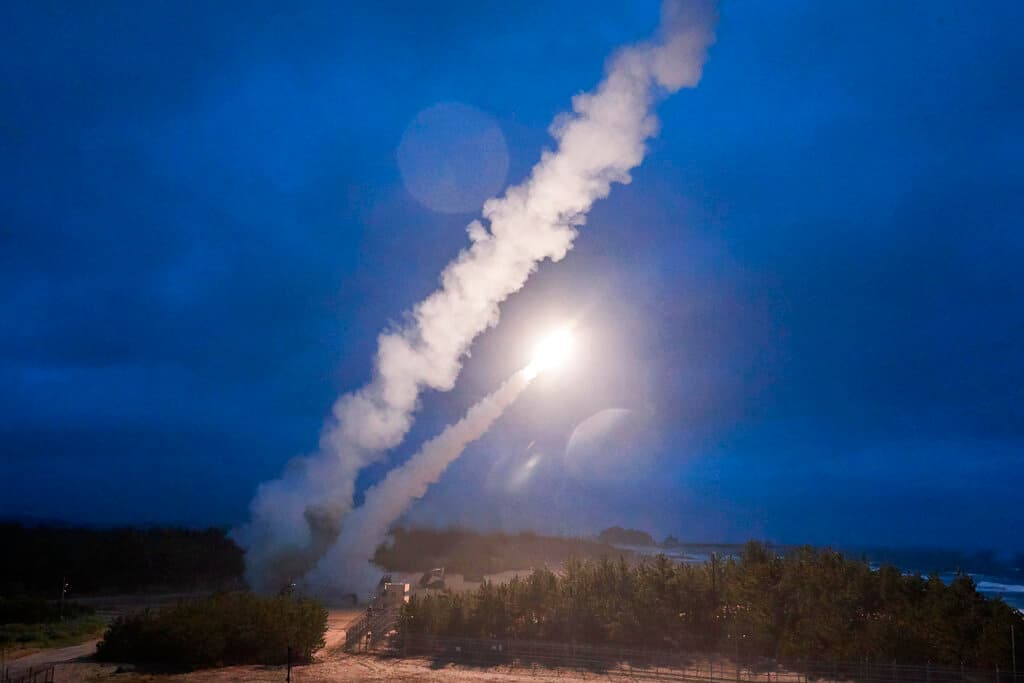Now Is Time To Show Strength in Face of North Korean Provocations
The most recent response showed South Korea’s new president, Yoon Suk-yeol, would not look for dialogue in the style of his appeasement-minded predecessor.

A flurry of missile tests on both sides of the North-South Korean line marks a serious escalation of tensions in the long-running stand-off between the two Koreas. On Monday, the South Koreans and ally America fired eight missiles off the east coast a day after the North fired eight missiles into the same seas.
North Korea’s tests on Sunday came as a rebuke to the tough talk of the American, South Korean and Japanese nuclear envoys. American and South Korean forces responded less than 24 hours later, making good on the promise by America’s envoy, Sung Kim, of “adjustment to our military posture” — i.e., stepped-up defense of South Korea and also Japan.
Both Seoul and Washington intended to prove they were not backing down after the North Korean leader, Kim Jong-un, in a flagrant attempt at intimidation, ordered a salvo of eight short- to intermediate-range missile blasts.
If the North Korean tests showed Mr. Kim was determined to counter Sung Kim’s warning, the allied response showed South Korea’s new president, Yoon Suk-yeol, would not look for dialogue in the style of his appeasement-minded predecessor, Moon Jae-in. With his conservative government in place, Mr. Yoon said the North’s nuclear and missile tests were “threatening not only peace on the Korean Peninsula but also in Northeast Asia and the world” and vowed to “respond firmly and sternly to any provocation.”
The United States, South Korea, and Japan see the need to cooperate on joint military exercises and intelligence-sharing even if the latter two never bury their historical animosity and form their own alliance. Together, they aim to demonstrate to North Korea that its testing missiles and weapons of mass destruction will only compel them to build up their defenses. They should not back down whenever Mr. Kim, as expected, orders the North’s seventh nuclear test.
North Korea is intensifying its missile program even while Covid-19 spreads throughout the poverty-stricken country. The North’s claims of dealing successfully with the pandemic are bogus, as are the reports that fewer than 100 of its citizens have died from the disease. Those claims are as foolish as the North’s earlier claims that there were no cases at all of Covid-19 among its 26 million people.
Kim Jong-un has shown no sign of worrying about whether tens of thousands of his subjects wind up dying of the dread disease. North Korea is not able to feed all its people, 40 percent of whom are undernourished. Thousands fewer people to worry about would be one solution to the food problem. North Korean soldiers, those who are not in special units, are said to be weakened by hunger as well as Covid-19.
In the face of missile and nuclear tests, leaders in South Korea, the United States, and Japan should realize that Kim Jong-un is bluffing, that he’s in no position to attack anyone, and that he’s wasting money and resources on weaponry that he won’t dare use. He is well aware that if he fired a single missile against any of his enemies, he would be exposed to retribution that would destroy his regime. He would have to rely on his ally and great protector, China, to come to the rescue, as was the case in the Korean War — with the support, of course, of the former Soviet Union.
The danger of attack by North Korea on nearby targets, in South Korea and Japan, would be that of a wider war spreading to China and also to Taiwan, which China insists it needs to recover as part of “one China.” China’s president, Xi Jinping, however, does not want to risk a war that would deprive China of the huge profits it’s making from exports, particularly to America. For that reason, Mr. Xi should be exercising a restraining influence on Kim Jong-un, who cannot go beyond loud words and costly testing without China’s approval.
Now is the perfect time for South Korea’s conservative government to show increasing firmness in the face of North Korea’s nonsense. There is no reason for South Korea, the United States, and Japan to fall into a familiar cycle of concessions, talks, and yet another agreement that North Korea will be sure to violate.
If anything, South Korea and the United States should increase their joint exercises, staging them on land, in the air, and at sea. American and South Korean navy vessels have just wound up an exercise off the southern Japanese island of Okinawa, home of American air and marine bases. The aircraft carrier Ronald Reagan, which I visited years ago when it was off South Korea, joined in the war games.
We need to see more such exercises in Korea and surrounding seas and airspace. The more Kim Jong-un tests, the more strength our side needs to display. There is no other way to demonstrate the power of the forces aligned against him and the futility of his tests and threats.

